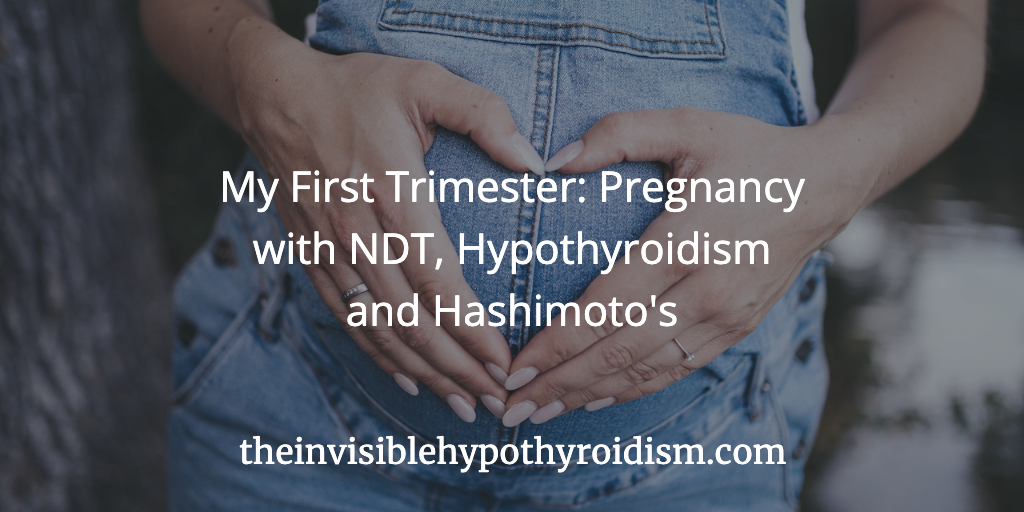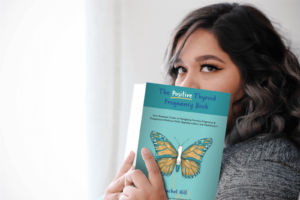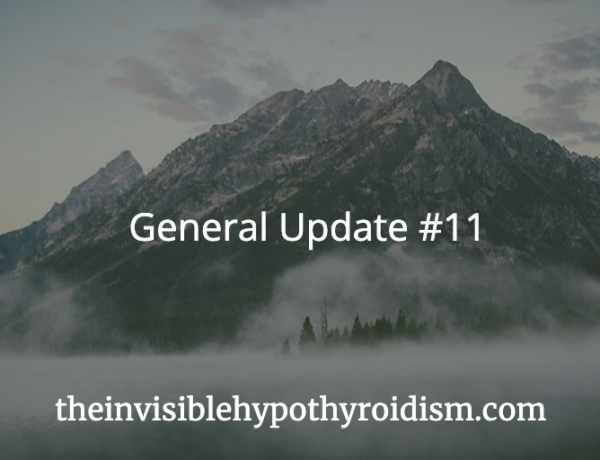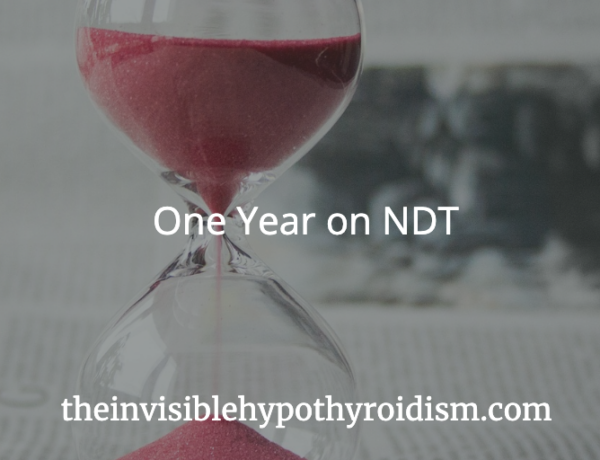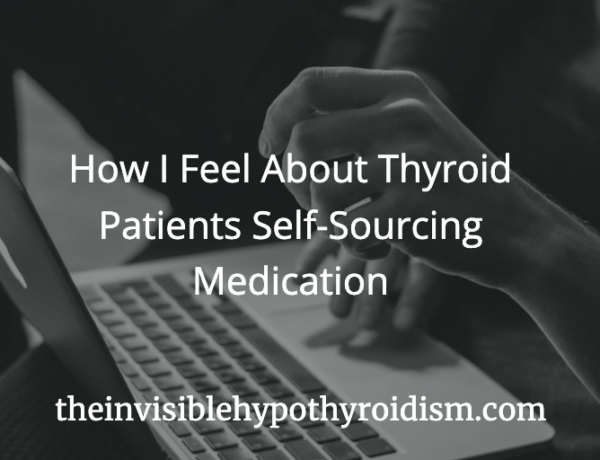Going through my first pregnancy with Hashimoto’s and hypothyroidism and being on unconventional medication for this (NDT – Armour) definitely presented some extra questions and challenges.
I was very anxious about the prospect of a pregnancy with my thyroid conditions, and in particular, in regards to whether me not being on Levothyroxine (like most people with hypothyroidism) would make it a more stressful experience. I wanted to blog about my experiences of going through pregnancy on NDT to give an insight in to how this medication worked for me during this time, but also as to how medical professionals reacted to it.
I’m in the UK and besides my NDT thyroid medication being prescribed by a private doctor, all other healthcare was on the NHS unless otherwise stated.
The first trimester is commonly said to be between weeks four and thirteen (since you’re already four weeks pregnant by the time you miss your period), so this is what this blog will be covering!
Related post: 13 Things I Did to Have a Healthy Pregnancy With Hashimoto’s and Hypothyroidism
Related Post: Was My Thyroid Pregnancy What I Expected?
***
Finding Out I Was Pregnant
I confirmed my pregnancy at four weeks, just a day before my period was due. Besides trying to conceive and so having an inkling I may be pregnant, other signs I had included not having any of my usual pre-period symptoms (light cramps, acne, headache), but also feeling a bit faint, having hot sweats and feeling very emotional.
Overall, I felt quite tired during week four, and even wondered if it was down to my Hashimoto’s or hypothyroidism, as it felt just like thyroid fatigue. However, blood tests showed that my thyroid levels were good.
A couple of days after finding out I was pregnant, cramping started, which did worry me as it felt a lot like period cramps, but turned out to be a common and normal early pregnancy symptom. I also had on-off diarrhoea and some acid reflux for the first week or two.
I made appointments to speak to my private GP and NHS GP as soon as I discovered the pregnancy.
First Trimester Appointments
I saw my private GP for the first time during this pregnancy when I was five weeks pregnant. He was very happy for me and had no issues with me carrying on NDT during pregnancy at all.
He didn’t want to increase my dose immediately, but rather wait for blood test results (a full thyroid panel) which he would receive a week later. My levels were already optimal at a recent test and he didn’t want to risk overmedicating me. He printed out some information for me to pass to my NHS GP regarding why he will be favouring Free T3 and Free T4 levels over TSH alone while managing me during pregnancy.
My NHS GP appointment (also at five weeks pregnant) went well too, and better than expected. I was anxious about him pushing back about the NDT, but he actually acknowledged that some people don’t do well on Levothyroxine and require T3 medications, which the NHS often cannot afford and do not hold a lot of evidence in using.
So, he was happy for me to continue the NDT during pregnancy and mainly be managed by the private GP, but did make a referral to an NHS endocrinologist and obstetrician to also get their input.
The NHS GP explained that I would need a full thyroid panel checking every four to six weeks during pregnancy until week twenty, and then after that tested once or twice more before birth (however, I ended up having a full panel tested every 4-6 weeks throughout pregnancy instead). I was pleased that he was so on the ball with testing my levels often, as it meant it would save me a lot of money from ordering them myself privately.
The ranges used on my thyroid tests were the following (as they’re adjusted when you’re pregnant):
TSH:
(Non-pregnancy range for TSH is usually around 0.5 – 4.4 mu/L)
- 1st Trimester: 0.09 – 2.83 mu/L
- 2nd Trimester: 0.2 – 2.8 mu/L
- 3rd Trimester: 0.31 – 2.9 mu/L
Free T4:
(Non-pregnancy range for Free T4 is usually around 10 -20 pmol/L)
- 1st Trimester: 10.5 – 18.3 pmol/L
- 2nd Trimester: 9.5 – 15. 7 pmol/L
- 3rd Trimester: 8.6 – 13.6 pmol/L
Free T3:
(Non-pregnancy range for Free T3 is usually around 3.5 -6.5 pmol/L)
- 1st Trimester: 3.5 – 6.2 pmol/L
- 2nd Trimester: 3.4 – 5.8 pmol/L
- 3rd Trimester: 3.3 – 5.6 pmol/L
Something worth keeping in mind is that HCG, the pregnancy hormone, stimulates the thyroid, often leading to a lower TSH compared to before pregnancy. This is why test ranges change for pregnant women.
I booked in for my first thyroid blood test and had it taken that same morning (at five weeks pregnant). The results came back with my thyroid levels still optimal, but I asked the private GP if I could increase my dose slightly to support the development in the first trimester. It is also often suggested that this is done (the Endocrine Society’s 2007 Clinical Guidelines for the Management of Thyroid Dysfunction during Pregnancy and Postpartum says that thyroid medication usually needs to be increased in dosage, by four to six weeks of gestation and may well require a 30-50% increase in dosage). He agreed for me to increase it ever so slightly and then be retested in another four to six weeks or so, but that if I felt unwell at any time, he would suggest I lower it again and be tested sooner.
The midwife referral was also made at five weeks, with the first appointment booked for when I would be eight weeks pregnant. They don’t typically see you before this.
At eight weeks pregnant, I decided to have a private ultrasound scan, just to calm my anxiety about a small amount of bleeding at six weeks pregnant (see more on this below). Baby was measuring ‘perfect’ in size and heart rate, which was a huge relief.
My first midwife appointment was very positive. She was more than happy to leave the thyroid stuff to the NHS GP and private GP, and couldn’t see any reason for me to be a high risk pregnancy.
See related post: Are Pregnant Women With Thyroid Problems Considered High Risk?
Also at eight weeks, I had my first appointment with the NHS endocrinologist, which my NHS GP referred me for, just to be on the ‘safe side’.
As expected, the endocrinologist lectured me about on being on NDT medication and told me that if it wasn’t prescribed, i.e. self-sourced (which I used to do before obtaining it on private prescription) then she would have to make me go back to Levothyroxine. I have since learned however, that this is incorrect as no medical professional can force any type of treatment on you during pregnancy.
As my NDT is prescribed (from the private GP I see), she said she couldn’t suggest much in terms of managing this during pregnancy but could only recommend that I move back to Levothyroxine, despite both me and my husband explaining in detail to her, how ill I was on Levothyroxine before. She suggested that my low TSH (which is often seen as ‘normal’ with NDT) and being on NDT in pregnancy was not safe and could cause issues such as miscarriage and other risks. She also told me that I am at risk for heart issues and osteoporosis due to this, but when I asked for the evidence on all the claims she was making, she told me that the NHS didn’t have any, despite then claiming that she was an evidence-based practitioner and disagrees with what my private doctor is doing.
I asked to be discharged as I didn’t see the benefit of seeing her and she agreed that there was nothing she could do to input in to the situation.
At ten weeks, I had my second lot of thyroid tests. They showed that I was now overmedicated, so both the NHS and private GP suggested I lower my NDT dosage back to the original amount, which I did (and also agreed with). However, the NHS GP did interestingly state that “it is better to be slightly hyperthyroid in pregnancy compared to hypothyroid.”
I must admit though, I did feel better when I went back to the original NDT dose.
I booked a further private ultrasound scan at ten weeks due to a bit more bleeding, but all was fine again. This was great for reassurance, as I was constantly anxious about something going wrong and my thyroid medication being blamed for it.
I saw the NHS GP again at twelve weeks to discuss how I was getting on. He said he was completely happy for the private GP to manage NDT dosage adjustments, but that he was still wanting to run the full thyroid panel on the NHS regularly to keep an eye on things. After the endocrinologist discharged me a few weeks prior, the NHS GP said that he was happy to leave it at that and that he was glad an endocrinologist had at least had the opportunity to be involved.
How My Health Was in The First Trimester
Week 5
I felt achey and tired, with a ‘heavy feeling body’ some days and overall quite lethargic. I had my first pregnancy migraine and also suddenly felt really hungry once the diarrhoea had stopped (which lasted a week). I had had no appetite for the last week (due to having diarrhoea), so I was now making up for it by eating everything in sight!
I had cramps similar to period cramps for most of the first trimester.
Week 6
At week 6, I was very concerned about some light, pink bleeding (as touched on above) but spoke to the GP and midwife who weren’t concerned as it apparently happens in quite a few pregnant women as the baby is ‘settling’. However, I booked a private scan for 8 weeks for peace of mind.
I also started experiencing morning sickness in the form of nausea after eating, but I wasn’t physically sick at all, which was helpful as I’m not sure what I would have done if I couldn’t keep my thyroid medication down. During week six, the fatigue, muscle aches and pains, lower back pain, sore breasts and big appetite continued. I felt rather lethargic and unmotivated, so slept quite a lot.
Week 7
I was more than ‘just hungry all the time’ and now felt ravenous constantly. I was also nauseous a lot too, which didn’t help as I wanted to constantly be eating. Despite eating a lot, I never actually felt full!
Week 8
I experienced random jaw stiffness and booked myself in to the dentist, but she didn’t see anything that was a cause for concern. Again, I was told that this is apparently another random yet common symptom in pregnancy, and I also started to experience acne on my chest and shoulders. My face was very clear and had been since finding out I was pregnant.
Week 9
I had my first ever migraine with aura in the ninth week, which was pretty darn scary. I didn’t have another after that one either.
Week 12
My clear skin and ‘pregnancy glow’ changed in to acne everywhere – on my jaw and neck, face and back. During week twelve, I experienced migraines for several days in a row as well as acid reflux on most days. The fatigue was gone though, and on the whole I felt pretty ‘normal’, as I was able to do day-to-day things easily again, without the pregnancy fatigue getting in the way.
***
You can click on the hyperlinks in the above post to learn more and see references to information given.
Read My Second Trimester: Pregnancy with NDT, Hypothyroidism and Hashimoto’s blog here.
If you’re looking for an online support group, I came across this one: Pregnancy and Hypothyroidism on Facebook. Please note that I am not a member or admin.
Books I found useful in my pregnancy:
- Your Healthy Pregnancy with Thyroid Disease
- The Thyroid Hormone Breakthrough
- The Positive Birth Book
- The Pregnancy Encyclopedia
- What to Expect When You’re Expecting
- Healing Your Body Naturally After Childbirth
- The Positive Breastfeeding Book: Everything you need to feed your baby with confidence
- Mindful Hypnobirthing: Hypnosis and Mindfulness Techniques for a Calm and Confident Birth
I have now recorded my full journey all in one place!
The Positive Thyroid Pregnancy Book: Your Essential Guide to Navigating Fertility, Pregnancy & Postpartum Wellness With Hypothyroidism and Hashimoto’s also covers my two pregnancies with hypothyroidism and Hashimoto’s in a lot of detail, while also compiling ALL the info you need to know for the best start for you and your baby!

